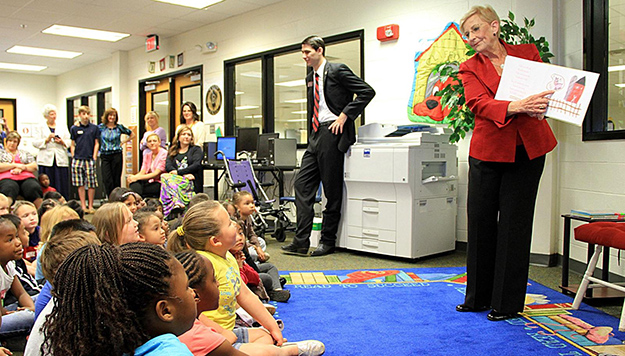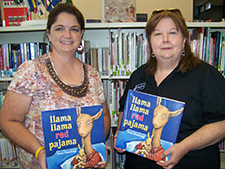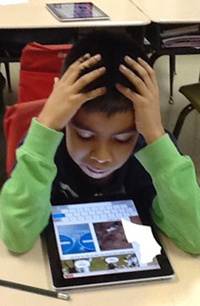Polk County Takes on Grade-Level Reading Challenge with Multi-Faceted Strategy
Print This Post |
| First Lady of Georgia Sandra Deal reads to a pre-k class in Polk County. |
BY DIANA ST. LIFER
Countless studies have shown that reading proficiency by third grade is the most significant predictor of high-school graduation and career success. Not one of the most—the most. It is at this crucial juncture in elementary school when a child transitions from learning to read to reading to learn, and if the student isn’t reading on grade level before entering the fourth grade, the consequences can be long term and significant. In Georgia, that translates to nearly 70 percent of students who are at risk of failing or dropping out of school.
 Cedartown Public Library manager Sharon Cleveland (left)
Cedartown Public Library manager Sharon Cleveland (left)
and Polk Family Connection coordinator Rhonda Heuer at a book donation event.
The message, says Rhonda Heuer, is loud and clear in Polk County, which is one of three counties participating in the Early Childhood—Grade-Level Reading cohort that Georgia Family Connection Partnership launched in fall 2013. Heuer is coordinator of the Polk County Family Connection Collaborative and a member of the statewide Grade-Level Reading (GLR) Campaign Steering Committee. The goal of the statewide campaign is to increase the number of Georgia children reading at or above grade level by NAEP (National Assessment of Educational Progress) standards by the end of the third grade from 35 to 60 percent by 2020.
Heuer, however, has a more ambitious goal. “We’ve been working on early childhood education and grade level reading for years, “ she said of the county that is home to 41,000 residents. “But in many ways it was like working with Jell-O. We couldn’t pin anything down. Today we’re more clear about what we need to do to be successful. That success would come in the form of having every third grader reading at grade level by 2016. That’s our ideal goal—to have 100 percent of our third-grade students reading proficiently.”
|
Making Connections, Providing Opportunities “Making connections and offering opportunities are our best ways of supporting our children and families,” said Rhonda Heuer, Polk County Family Connection coordinator. “It’s about bringing to them information and the best resources available.” Meet Polk County’s Early Childhood—Grade-Level Reading Campaign partners: • Polk School District |
Heuer’s optimism is sparked by the fact that while Georgia’s ranking in education remains 38th in the nation, the number of fourth graders proficient in reading actually improved over the past year, bringing the state on par with the national proficiency level, according to the 2013 KIDS COUNT Data Book. And in 2012, 93 percent of Polk County third graders met or exceeded state standards on CRCT (Criterion-Referenced Competency Test) in Reading.
While the improvements are encouraging, the ground work toward reading proficiency begins long before the child enters kindergarten and has various contributing factors, including exposure to early childhood education, family income, primary language spoken in the home, and the parents’ level of education. In short, the plan for success must be strategic and battled on multiple fronts.
“One of the first steps,” Heuer said, “is informing parents that they are their child’s first teacher. That needs to begin even prenatally. We need to do more in the area of working with the families.”
The reality of that challenge became clear to Heuer at a recent school parent meeting. “We asked the parents to make flashcards with common words to use with their children,” she explained. “When I looked around the room I saw that the children were the ones making the cards because most of the parents couldn’t speak English.”
A language other than English is spoken in nearly 12 percent of the households in Polk County. “We have a high percentage of Hispanic families,” Heuer explained. “It’s not just a literacy issue, but an ESL (English as a Second Language) issue.”
At one point, the Polk County Family Learning Center provided high-quality childcare for the children of parents enrolled in an ESL or GED (General Education Development) program. But when funding ran dry after a decade, although the adult education classes are still offered, childcare was eliminated.
Getting Every Child in Preschool

Between 2007 and 2011, nearly 50 percent of Georgia’s children ages 3 and 4 were not enrolled in preschool, and in Polk County the rate was even higher at 53.1 percent. Enrolling more children in preschool benefits not only the families but the entire community as well, Heuer says, which is why plans to open a Montessori School at the Northwest Georgia Housing Authority in Rockmart is a step in the right direction. “All housing authority residents will be able to enroll their children free of cost,” she explained. “It’s really exciting.”
“The sooner a child is enrolled in an early education program, the better chances a developmental delay can be detected and addressed,” said retired educator Scotti Worthington, a member of the Polk County Board of Education and the district’s early intervention coordinator at the Georgia Dept. of Public Health’s Babies Can’t Wait program. The statewide interagency service delivery system for infants and toddlers with developmental delays or disabilities is just one of several partners in the Grade-Level Reading Campaign.
“As soon as a delay is identified, remediation with the appropriate resources can begin and the more ready that child will be to begin school,” Worthington explained. “Any kind of delay can have an impact on reading, especially if it’s a language issue, because early language skills are a precursor to good reading skills.”
The Economics of Words
Worthington explained that the difference in the number of words a child from a low socio-economic background hears compared to children from higher incomes “is astonishing.” The gap, according to one study, is about 30 million words over four years. That’s quite an impact for the 72 percent of children enrolled in the Georgia Pre-K program in 2012 who were from low-income families. That same year, the number of children living in poverty in Polk was at a five-year high at 32.7 percent.
Initiatives
Heuer says the Polk County Collaborative is working to alert the business community and organizations about the link between early education, graduation rates and future success. The Collaborative sponsors programs to get books into the hands of every child, and encourages members of the community to participate in reading initiatives. Book donation boxes are strategically located throughout the county in pediatricians’ offices, Laundromats, and other places where families gather, and parents receive educational materials about the importance of reading. And if there’s an agency or organization that provides services to children and families, Heuer is determined to make literacy awareness part of the mix.
The Collaborative also is using technology whenever possible to enhance students’ reading experience. Every 9th and 10th grader in the district receives an iPad, and the district recently purchased MyON Reader, which provides access to thousands of digital books from preschool level through 12th grade.
 Getting an iPad into every student’s hands is reinventing reading.
Getting an iPad into every student’s hands is reinventing reading.
“This complete literacy solution reinvents student reading,” Heuer explained. “It has features only digital content can offer like spoken word audio to model fluency, sentencing highlighting and an embedded dictionary.” The tool also has reading assessment capabilities that allow educators to measure and forecast students’ reading growth.
“Polk County began working to improve early childhood literacy 14 years ago with the Early Childhood Initiative funded by the Appalachian Regional Commission,” said Rebekah Hudgins, community cohorts project manager at GaFCP. “Since then, significant changes in services, including the Family Learning Center, have changed the face of early childhood education in Polk. It is so exciting to see this work re-invigorated and expanded with use of 2014 technology and the latest early childhood and education research.”
Diana St. Lifer is a professional writer with more than 25 years’ experience. She holds a bachelor’s degree in communications, a post-B.A. certificate in child advocacy, and is a certified professional life coach who specializes in teen and adolescent issues.
Maria Lara not only believes amazing things can happen when you seize opportunities, she’s living proof. She and her four children, all under age 11, came to the United States from Mexico in 1994. Lara was 34 years old and couldn’t speak a word of English, but she was determined to assimilate to the culture for the benefit of herself and young children.
Read “A Mom Takes Strides to Close the Literacy Gap.”
Low birthweight, childhood obesity, and a literacy gap are serious threats to the well-being of Georgia’s families and children. Recognizing the impact these pressing issues have on the state’s health, safety, and ability to prosper, Georgia Family Connection Partnership has launched three initiatives dedicated to developing and implementing strategies that address these key indicators.
Read “Eleven Family Connection Collaboratives Team Up to Tackle Key Indicators of Child and Family Well-Being.“
